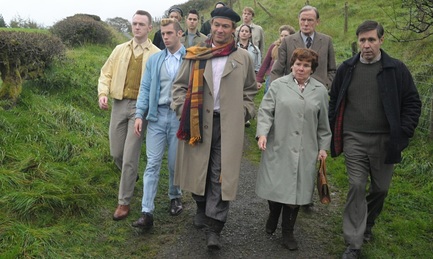On the London side, writer Stephen Beresford is utilizing every gay archetype that's ever been depicted on film. Ben Schnetzer plays the fiery leader of the group, consumed with what the next move is in every moment. Dominic West and Andrew Scott play the couple whose bookstore the group (Lesbians and Gays Support the Miners, or LGSM) operates out of. West is an occasionally difficult out-and-proud stalwart who never met a homophobe he couldn't make uncomfortable, while Scott seems his opposite, a dour Welshman emigre still consumed with being rejected for his orientation many years earlier. The closest thing to a lead Pride has is the most standard plot of all, a teenager struggling to come out of the closet to his casually hateful family. This character, portrayed by George MacKay, never really pops out of the screen like most of the Welsh characters or West and Scott do, perhaps because while the casual homophobia and pressure to be straight is undoubtedly real, Beresford, Warchus, and MacKay don't really do anything novel with it. In a 2-hour film with this many threads to service, plus the overarching fundraising/acceptance battle being fought, some things are going to be left at the wayside, and MacKay's plot is the main victim.
Within the class and sexuality issues are also inserted a gender dynamic, as if Pride didn't have enough going on. One of the few L's in the LGSM, Faye Marsay's character is constantly agitating for women's own space within the group, something that baffles the G's. The Welsh women are intrigued by the few lesbians in the LGSM, coming at them with questions that shift a sexual worldview which formerly viewed pleasure as solely men's province. All the LGSM members are inspired in turn by the strength of the Welsh women, who've taken on the burden of organizing and sustaining their families on less and less while their husbands and sons head to the picket lines. The strike itself is depicted as a woman's battle, though it's the men who have seen their wages slashed. They are the ones that give the men the fortitude to press on, despite their emasculation at being out of work and no longer providers. A mid-film show-stopper of a scene delineates exactly that, as the women break out into a beautiful union anthem that brands them as the guardians of community and family, counter to the woman at the head of the government that is literally starving them out. It's this dynamic that feels the most interesting, though it's slightly further down the list of Pride's priorities.
Pride leaves the viewer with plenty to grab onto in the way an ensemble TV show does; if you don't like one particular thread, wait a few minutes and one you like will take its place. Warchus captures several scenes and performances absolutely worth the wait. Some pruning of its many storylines would've helped, but the overall package is a true, rousing crowd-pleaser. B+

 RSS Feed
RSS Feed